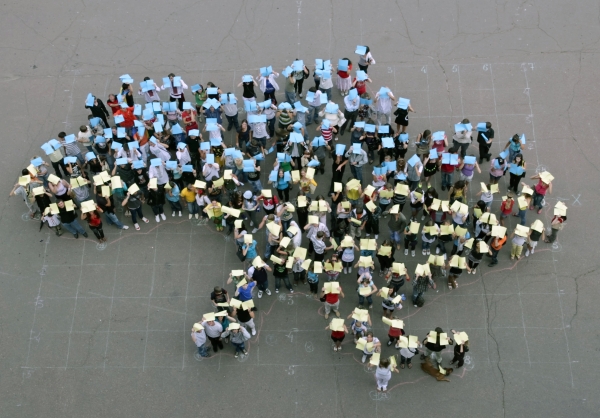92% of citizens of Ukraine consider themselves ethnic Ukrainians, according to the Razumkov Center survey. 6% of the respondents consider themselves ethnic Russians, 1.5% account for other ethnic groups. It has been the highest recorded rate concerning Ukrainian self-determination since Ukraine gained independence. Russian annexation of Crimea and aggression in Donbas accelerated the self- identification process, say sociologists.
According to 2001 census, 78.8% citizens called themselves Ukrainian, in 2015 (according to Razumkov Center) it was 86%, and today it is 92%. According to the survey, the percentage of those who consider themselves Ukrainian is higher among the youngest audience – from 18 to 22 years old (96.2%). Among those over 60 it is less than 90%.
Deputy Director General of the Razumkov Center Yurii Yakymenko named the reasons for the leap: the number of ethnic Russians reduced after the Crimean annexation and Donbas occupation, and besides Russian aggression affected people who considered themselves as belonging to two nationalities, now they consider themselves Ukrainians.
Biethnicity of Ukrainian population
The survey also specified the problems of biethnicity and multiple ethnicities as an aspect of ethnic identity formation. 74% of respondents in Ukraine feel they belong to only one nationality, 12% – two or more nationalities 6% – do not feel they belong to any nationality, 8% – undecided.
While 77% ethnic Ukrainians feel they belong to only one nationality, only 39% ethnic Russians feel the same: two or more nationalities – respectively, 10% and 30%, not any nationality – 5% and 20% respectively.
Most respondents who feel they belong to two or more nationalities live in Donbas (27%), Southern (24%) and Eastern (19%) regions, while in West and Center it is only 6%. Residents of these regions most often do not feel as belonging to any nationality (respectively 20%, 10%, 12%, 2% and 1%).
“Thus, along with biethnicity or polyethnicity we can also mention either denying or distancing from ethnic self-identification, which (along with bi- or polyethnicity) in Ukraine is more characteristic of ethnic Russians,” note sociologists.
Native language: Ukrainian or Russian?
68% of citizens consider Ukrainian their native language, 17% – both languages (Ukrainian and Russian), 14% – only Russian, 0.7% – other languages. In the Western regions 93% of respondents consider Ukrainian their native language, in Central – 84%, in Southern – 42% , in Eastern – 36%, in Donbas – 27%. The proportion of those who consider Russian their native language is, respectively, 2%, 6%, 31%, 24% and 42%, both Ukrainian and Russian – respectively, 3%, 10%, 26%, 38% and 29%.
The Ukrainian identity factor is associated with more frequent use of Ukrainian, said Yurii Yakymenko. Among ethnic Ukrainians 73% consider Ukrainian their native language and 18% both Ukrainian and Russian equally.
Restoration of the USSR
According to a previous survey by the Razumkov Center, in November 2016, two-thirds (65%) of Ukrainians did not seek for the Soviet Union restoration, 13% answered “Yes”, another 22% answered “Yes, but I understand that under current conditions it is impossible”. Among ethnic Ukrainians 69% answered that they did not seek for the Soviet Union restoration; among ethnic Russians – only 39%.
According to the latest survey, 27% of respondents in Ukraine consider themselves citizens of the former USSR. Residents of the South and East mostly consider themselves the citizens of the former Soviet Union – (48%) and (41%). In other regions the proportion ranges from 17% to 21%.
The survey was conducted by the Razumkov Center on March 3-9, 2017. It included 2,016 respondents in all regions of Ukraine except occupied territories.





